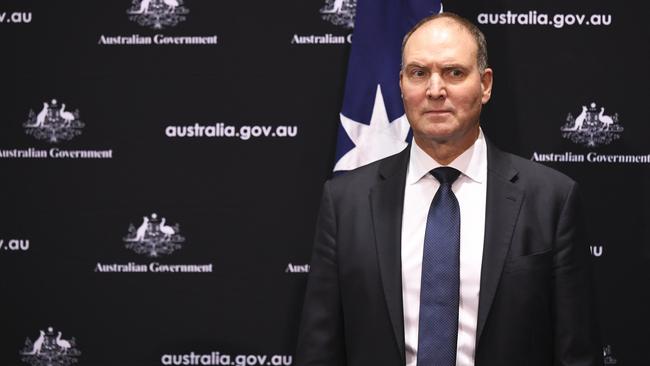Overseas coronavirus outbreaks threaten our recovery: Nev Power
COVID-19 commission chair Nev Power says new outbreaks in the US and South America could slow Australia’s recovery.

National COVID-19 Coordination Commission chairman Nev Power has warned that growing coronavirus outbreaks in the US and South America could slow Australia’s economic recovery from the pandemic, and potentially even threaten the resources exports that have kept the nation’s export backbone strong.
Mr Power told a mining conference on Wednesday the commission’s work was now focusing on sectors threatened by outbreaks overseas, particularly those reliant on international travel — including tourism, the services sector and education.
“This is not just about the Australian context, but more so how other countries go,” Mr Power said. “If we look at the world around us today we see other countries in the depths of the growth of the spread of the virus, particularly South America.
“In North America as well, we’ve seen major outbreaks in Texas in the last 24 hours or so, and of course we’re all waiting and bracing for the impact as it goes through Africa and other parts of Asia.
“It could well be that Australia and New Zealand — and perhaps a few other nations — are islands that have very low levels of coronavirus in a world that has high levels.”
But he said that while Australia’s mining sector had held up well through the coronavirus crisis, it should not be complacent as the spread of COVID-19 could eventually hit demand for Australian exports.
“It will restrict travel and will likely impact demand for our raw materials and resources going forward. So while it won’t be impacting us from a supply perspective, there is a very real question mark about the global economy and the impact on demand for us here,” he said.
Mr Power said Australia’s success in combating the coronavirus could allow a reinvigorated manufacturing sector — focused on downstream processing of the nation’s minerals and energy resources — to take advantage of global supply chain issues caused as COVID-19 advances through South and North America, and Asia.
He told the Mines and Money Virtual Connect conference that Australian industry should look to push down the processing chain in nickel, lithium, fertilisers and petrochemicals to break the processing “oligopoly” held by major manufacturing nations in Asia — and cheap gas and energy prices were the key to success.
“In a lot of cases with critical minerals and battery minerals much of the processing is done in one or two countries globally, which means we’ve got a monopoly or oligopoly formed in that mineral processing and there’s an opportunity to move downstream and leverage the fact that we’ve got the raw materials here and — at least in some parts of the country — low energy costs, and the availability of skilled labour,” Mr Power said. “Lithium and nickel would be the best examples of this, but there are others in the rare earths and critical minerals area we can look at.”
But that could depend on the success of controversial proposals to put natural gas exploration and production at the centre of Australia’s economic recovery plans, targeting a long-term gas price of $4 a gigajoule.
Mr Power conceded that that price was ambitious, but said a “stretch target” was needed to incentivise companies to find ways to reduce local gas prices.
But major gas producers have been pushing back on suggestions consumers would benefit from government intervention in the east coast gas market, including domestic reservation policies and taxpayer-underwriting for a transcontinental pipeline, both ideas floated by the NCCC.
Shell Australia chairman Tony Nunan said on Wednesday that the cost of producing gas had fundamentally changed from a decade ago. “The cost of supply for resources on the east coast of Australia now are just higher than what they were a decade ago,” Mr Nunan told the Credit Suisse Australian Energy Conference.
While prices on the east coast spot market have declined substantially this year reflecting a fall in Asian LNG prices, it was unrealistic to expect contract prices to revert back to historical $3-$4 a gigajoule levels.
Shell supplied 16 per cent of east coast gas demand in 2019.



To join the conversation, please log in. Don't have an account? Register
Join the conversation, you are commenting as Logout